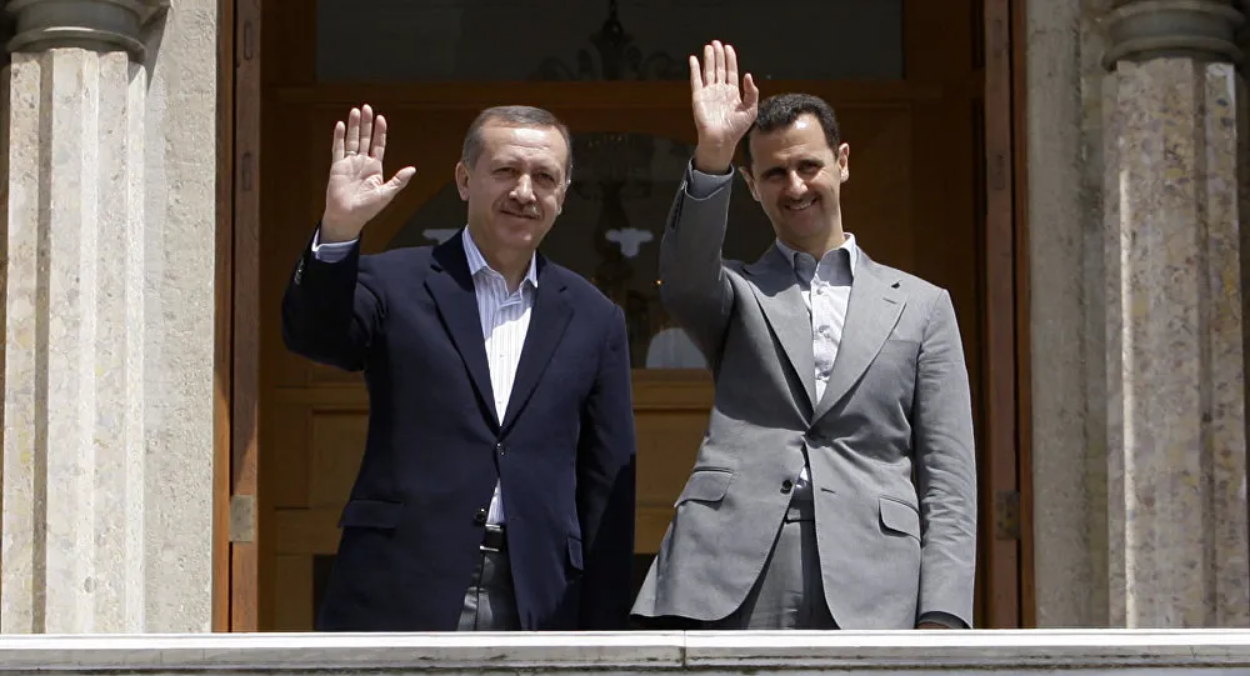


After over a decade of severed ties, Turkish President Erdogan has expressed his interest in restoring relations with Syrian President Assad during a flight back from Berlin. Both leaders, who had enjoyed a close personal relationship in the past, have signaled their willingness to normalize diplomatic relations amid regional tensions. This comes as Turkey faces pressure to repatriate millions of Syrian refugees and has recently faced anti-refugee sentiment within the country. Additionally, a lawsuit has been filed accusing Syria, along with Iran and North Korea, of supporting a recent attack by Hamas on Israel.
Turkey and Syria: A Renewed Diplomatic Overture Amidst Regional Tensions
Turkey and Syria have been at odds for over a decade, but a recent overture by Turkish President Recep Tayyip Erdogan has raised hopes of a reconciliation. Erdogan expressed his willingness to restore relations with Syrian President Bashar al-Assad during a flight back from Berlin.
Background
Turkey and Syria were once close allies, but the outbreak of the Syrian civil war in 2011 strained their relationship. Turkey supported the anti-Assad rebels, while Syria accused Turkey of aiding and abetting terrorism. The conflict led to a massive influx of Syrian refugees into Turkey, exacerbating tensions between the two countries.
Erdogan's Initiative
Erdogan's proposal for rapprochement comes amidst a backdrop of regional tensions and domestic pressure. Turkey is facing pressure from the international community to repatriate Syrian refugees, especially as anti-refugee sentiment grows within the country. Additionally, a lawsuit has been filed against Syria, accusing it of supporting a recent Hamas attack on Israel.
Assad's Response
Assad has signaled his openness to normalizing relations with Turkey. In an interview with Russian media, he stated that he was willing to meet Erdogan under the right conditions. However, he also emphasized that any reconciliation must be based on mutual respect and the withdrawal of Turkish troops from Syrian territory.
Implications
A rapprochement between Turkey and Syria would have significant implications for the region. It could help resolve the Syrian refugee crisis, ease tensions in the Middle East, and reduce Turkey's burden of hosting millions of refugees. However, it could also complicate Turkey's relationships with its Western allies, who view Assad as a war criminal.
Top 5 FAQs
1. Why has Erdogan expressed interest in restoring relations with Assad?
2. What are the conditions for normalization of relations?
3. How will Western allies react to a Turkey-Syria reconciliation?
4. What is the significance of the Hamas attack lawsuit against Syria?
5. Is a reconciliation between Turkey and Syria imminent?

In an audacious heist, a group of armed thieves breached security at the iconic Louvre Museum in Paris and stole nine valuable jewels from the collection of Napoleon Bonaparte and Empress Joséphine. The robbery, which took place in just seven minutes, has prompted a full-scale police investigation and raised concerns about the museum's security. French officials are working to recover the stolen items, but the Louvre remains closed to visitors.

Despite a ceasefire in early October, the conflict between Israel and Palestine shows no signs of abating, with reports of ongoing deadly clashes and Israeli tank fire targeting a car in Gaza City. The closure of the Rafah border crossing to Egypt, citing Hamas's failure to retrieve bodies, has further exacerbated tensions. However, experts warn of the uncertain future for a transitional government in Gaza and the risk of breaching the fragile ceasefire. The violence and closure highlight the ongoing humanitarian crisis and the need for both sides to engage in peaceful negotiations.

Hundreds of travellers heading to India from Italy for Diwali were left stranded after Air India cancelled its Milan-Delhi flight due to a technical issue. The sudden breakdown of the flight raised concerns about making it home in time for the festival. Some passengers even face the prospect of celebrating Diwali away from home due to rebookings on alternate flights. Air India assured that they are prioritising passenger safety and comfort while providing necessary support to those affected.

On day 1,312 of Russia's war on Ukraine, tensions continue to escalate as Ukrainian drones target a Russian oil pumping station, Russian forces seize three more villages in eastern Ukraine, and NATO increases its presence in the Baltic Sea region. In response to the ongoing conflict, the Ukrainian security service reports that the SBU caused a fire and halted operations in the Chuvashia region, while Russia's military announced its continued advance in Donetsk and Dnipro. Meanwhile, NATO's decision to deploy additional military assets comes after several days of unidentified drone sightings in Denmark and at military bases.

The upcoming India-Australia ODI series has drawn attention for multiple reasons, including the successful return of Rohit Sharma and Virat Kohli as white-ball players. Despite being relieved of captaincy, the duo is expected to continue playing in the format until the 2027 World Cup, according to Australia's Travis Head and India's Axar Patel. As both teams gear up for a high-stakes clash, the focus remains on the future of these two icons and their potential to lead India to another ODI World Cup victory.

Pakistani security forces have thwarted a suicide attack targeting their camp in Mir Ali, North Waziristan, after a vehicle loaded with explosives was driven into the perimeter wall. In a separate operation, 34 militants described as "India-backed terrorists" were killed in multiple engagements across Khyber Pakhtunkhwa. These operations form part of Pakistan's continued efforts to eliminate foreign-sponsored terrorism from the country under the vision "Azm-e-Istehkam."

Amid an intensified wave of militant activity in Pakistan's northwestern tribal belt bordering Afghanistan, security forces successfully foiled a major suicide attack on a military camp in North Waziristan's Mir Ali area. Four terrorists, including a suicide bomber, were killed in the exchange, with no casualties among security personnel. The incident highlights the ongoing threat of militant activity in the region, with recent counterterrorism operations resulting in the death of 88 militants, including several from the Tehreek-e-Taliban Pakistan (TTP).

Former US President Donald Trump shared news on his social media platform about a “very productive” phone conversation with Russian President Vladimir Putin, where they discussed progress towards ending the Russia-Ukraine war. Trump mentioned the possibility of a summit in Budapest involving top advisors from both countries, while also revealing that he will be meeting with Ukrainian President Volodymyr Zelenskyy to discuss the call and other matters. As India’s economy continues to grow, its luxury market is also thriving with high-end brands investing in the country to meet the increased demand.

Ukrainian President Zelensky is currently in Washington to meet with US President Trump. This meeting comes after Trump had a productive phone call with Russian President Putin, where they agreed to face-to-face talks in Hungary. Trump is considering arming Ukraine with advanced Tomahawk missiles, but stated that the US stockpile must also be preserved. Meanwhile, Trump has promised to update Zelensky on his discussions with Putin and believes that progress has been made.

The Ministry of External Affairs has denied that a phone conversation took place between Indian Prime Minister Narendra Modi and US President Donald Trump on Wednesday, contradicting Trump's claim that Modi personally assured him that India would stop purchasing Russian crude oil. Trump had announced this move as a big step, describing that the process had already begun. However, MEA spokesperson Randhir Jaiswal clarified that there was no discussion between the two leaders during a weekly briefing. This contradiction comes after the last confirmed phone call between the two on 9 October, when they discussed trade negotiations.